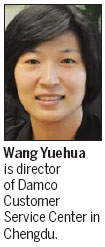
Danish company provides impetus for shifts in Chengdu's logistics
Shipping and oil conglomerate Maersk, consultancy firm Accenture, logistics major DHL, ecommerce major Amazon and cement company Lafarge are as different as chalk and cheese when it comes to their respective lines of business in China.
But a closer look reveals that all these companies have one thing in common - a strong and ongoing Chengdu connection for their global logistics operations.
|
 Shipping company Maersk's global logistics hub in Chengdu, capital city of Sichuan province. [Photo/China Daily] |
For a city that was until recently known for pandas and fiery cuisine, Chengdu has indeed come a long way. Logistics, financial services and high-end manufacturing have all combined to make Chengdu a bellwether of the government's "Go West" economic roadmap.
The transformation seems to have more than paid off as a combination of factors like less pollution, investor-friendly policies, robust financing facilities and modern amenities are drawing hordes of multinationals from diverse sectors to set up facilities in Chengdu.
The Copenhagen-based AP-Moller Maersk Group is already a well-known player in the global logistics trade with its extensive linkages to major ports and harbors in the world. Most of the daily operations are, however, coordinated from the company's global logistics hub in Chengdu, capital city of Sichuan province.
Though the Danish company was already present in China, it was only in 2009 that it stepped up its logistics activities by setting up a global service center and a logistics-processing branch at Tianfu Software Park in Chengdu. Despite several scale-ups and upheavals, the Chengdu logistics unit has become the global hub for Maersk.
|
 |
Alongside the Maersk facilities in Chengdu is a building of Tencent, China's biggest Internet company by sales. Damco, the logistics arm of the group employs about 1,000 people in its new customer service center that occupies the building's bottom three floors. The Maersk Global Service Center, which provides the back office functions for group companies, is located in the same facility in the top two floors.
Maersk has five GSCs, three in India and one each in Chengdu and Manila. The Chengdu center is undoubtedly the fastest-growing GSC of the group. It provides customer service documentation, online booking, online customer service with finance and accounting processes.
"Chengdu GSC has been developed vary fast over the past two years. We will continue to grow the Chengdu center though it is now already covered the support of almost 40 percent of our export globally," says Shao Wei, senior director of the Maersk GSC Chengdu.
Apart from the impressive infrastructure that it has lined up to attract global majors, Chengdu also provides multinational companies an ideal opportunity to trim overall costs and a footprint to the vastly untapped markets in western China.
Multinational companies can also cash in on other factors like developed infrastructure, talented human capital and open investment environment. But the real draw for most logistics companies comes in the form of the excellent transport linkages that the city possesses with other major destinations in China.
Chengdu is already the fourth major air hub in China, with seven direct international flight connections and 12 code-sharing global linkages. By 2015, there will be at least 30 direct passenger and freight flights from Chengdu to major cities in the world.
Yet another factor that has helped industrialization is the cluster approach, especially for shared service centers. Global majors like Accenture, DHL, Lafarge and Amazon rub shoulders with domestic companies like Alibaba and Tencent to set up a robust chain of delivery or service centers.
"We believe that the Chengdu center will provide our global customers with better services and make our business more competitive," says Shao.